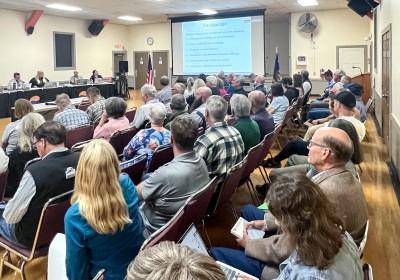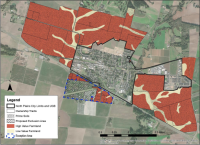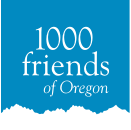By Sam Diaz | 3-minute read
Dragging into the late hours on a recent Tuesday night, three hours into a standing-room-only city council meeting, North Plains voted 6–1 in the first reading of an ordinance to more than double the town’s urban growth boundary (UGB) onto high-quality farmland – despite the majority of testimony asking the council to reject the expansion. Councilor Robert Kindel was the only representative to vote in opposition to this massive UGB expansion, in alignment with community sentiment.
1000 Friends of Oregon has been working with local residents on this contentious UGB expansion for the better part of the year, supporting community members writing testimony in opposition and submitting our own, and helping raise questions about the city’s ability to justify why expansion is necessary and pointing out a lack of description for the adverse consequences resulting from a possible expansion. 1000 Friends joined more than 25 Washington County residents and a newly formed group of residents, Farmland First, in opposition at the early September meeting. In contrast, about seven attendees supported the expansion proposal.
A work session follows on September 18 for the second and final reading, where a vote to adopt would be finalized. Following a North Plains City Council vote to expand its UGB, Washington County would vote on whether to approve, reject, or send the proposal back with conditions to North Plains. If you’re in Washington County, sign up for our emails and we’ll make sure you get catered updates about major changes to our communities and our lands.

First, what is an urban growth boundary expansion?
Oregon’s statewide land use planning system allows cities and towns to expand their urban growth boundaries. But first, cities and towns must demonstrate that they need the land in order to accommodate their community’s growth and have a plan for how to accommodate that growth and prevent, minimize, and remedy adverse impacts from the expansion.

This process, when done correctly, enables cities and towns to be thoughtful about the future, adopting local policies and directing investments to efforts that will improve the long-term quality of life for residents. Most UGB expansions in Oregon get approved – 40 out of 42 went through from 2016 to 2023, leading the Department of Land Conservation to suggest that “major change is not necessary. Almost overwhelmingly, the current process delivers timely, non-controversial results.”
Second, how does 1000 Friends of Oregon get involved?
1000 Friends gets involved in land use decisions, including urban growth boundary expansions, when Oregonians contact us raising questions and concerns about how their community is managing land use processes. If and where a city grows – especially out on high-quality farmland, in woodlands, and in a watershed – has irreversible consequences for residents and the environment.
We help residents, local businesses, and (from time to time) local elected officials and government staff understand how to determine if their city or town should expand their urban growth boundary. We also help raise critical questions to avoid a worst-case scenario – that a city council inadvertently sells out its town’s residents and resources for a short-term profit. Instead, 1000 Friends helps to simulate a best-case scenario, research and raise policies and investments to help the town build a better future for all, and bring legal assistance when necessary.
